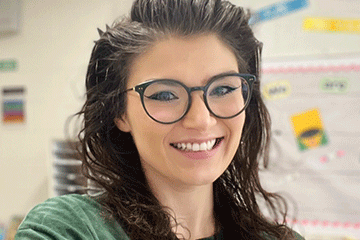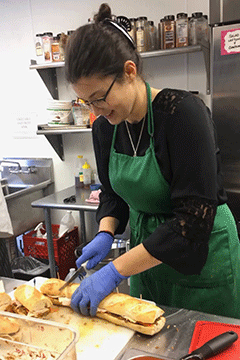Bulletin News

03/21/2023
If a child in the classroom of Newfield (N.Y.) Elementary School teacher Elisa Rodriguez M ’19 would rather play a video game, go on social media or watch television than read, she’ll say, “Sure. Just turn on the subtitles.
“I tell them all the time, ‘Visual scanning of the words as you listen to the audio is going to help you pick up things you don’t always notice,’” said Rodriguez, a K-5 intervention specialist in reading at Newfield Elementary, located in a small community outside Ithaca, N.Y.
“I think that a lot of what I try to do is just bring back some of that creativity and that joy to learning literacy skills. I’m trying to bring in non-academic things just to help the children stay motivated.”
Rodriguez’s non-traditional approach isn’t the only thing that sets her apart from her peers. Recently, she was recognized by one of the world’s largest reading education organization’s 30 Under 30 literacy leaders. The International Literacy Organization (ILA), a professional group with more than 300,000 members in 128 countries, was honored for her talent at getting children to master the difficult and essential skill of reading.
Rodriguez, 29, who’s worked in the Newfield District since Fall 2022 and earned an M.S.Ed. in literacy at SUNY Cortland, joined a global group of young educators and advocates from 15 countries. Fellow literacy standouts work in the United States, Norway, Afghanistan, South Africa, Albania, Ghana, Senegal, Bangladesh, Kenya, Hong Kong, Indonesia, Nepal, Philippines, France and Côte d’Ivoire.
The organization’s 30 Under 30 program, launched in 2015, casts an international spotlight on teachers, researchers, philanthropists, advocates and activists who share the common goal of literacy for every child.
In her ninth year of teaching, Rodriguez presently is part of a four-person team with two other reading specialists and a math academic intervention specialist.
As part of her role as the president of the Seven Valleys Reading Council, a ILA affiliate, she organizes literacy-centered professional opportunities for practicing and preservice educators, including virtual sessions focused on diversifying text sets and how the pandemic changed the teaching and learning of literacy skills across all grade levels.
After earning her bachelor’s degree in English in 2014, Rodriguez taught in Ohio and later co-taught a high school global literature class that combined English and history for the Board of Cooperative Educational Services (BOCES).
“I knew I always wanted to be in education and always wanted to be teaching,” Rodriguez said.
“I realized that a lot of the difficulties I dealt with in the classroom had to do with students’ perception of themselves as readers and writers,” Rodriquez said of her decision to pursue a literacy degree. “Cortland’s Literacy Program really helped me become a lot more focused on that reading route.
“The work we did in terms of learning diagnostics was super helpful and very relevant because that’s really what I do now,” Rodriguez said. “They give you the foundational knowledge, the framework and the tools you need to succeed in different settings.
“It’s like they were just giving you the keys and then you can unlock what you need in your practice.”

Her teaching also is shaped by her own very positive experience in school.
“When I was young, school was my happy place, my very successful place,” full of comfortable furniture and enjoyable children’s books read under the guidance of her kind teacher.
Rodriguez works especially hard with learners who may seem disenfranchised with reading and writing in general.
“Based on what had happened to them historically in school, at some point they decided, ‘Oh, I guess I’m not a writer, I’m not a reader, so I just don’t want to do this,’” she said.
“You’re watching them try to navigate learning a difficult skill while you’re trying to keep it fun and not frustrating, trying to keep it a game by incorporating a lot of play into what they do.”

